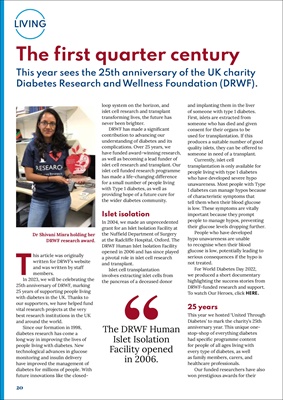
20
LIVING
The first quarter century
This year sees the 25th anniversary of the UK charity
Diabetes Research and Wellness Foundation (DRWF).
This article was originally
written for DRWF's website
and was written by staff
members.
In 2023, we will be celebrating the
25th anniversary of DRWF, marking
25 years of supporting people living
with diabetes in the UK. Thanks to
our supporters, we have helped fund
vital research projects at the very
best research institutions in the UK
and around the world.
Since our formation in 1998,
diabetes research has come a
long way in improving the lives of
people living with diabetes. New
technological advances in glucose
monitoring and insulin delivery
have improved the management of
diabetes for millions of people. With
future innovations like the closedloop system on the horizon,
and
islet cell research and transplant
transforming lives, the future has
never been brighter.
DRWF has made a significant
contribution to advancing our
understanding of diabetes and its
complications. Over 25 years, we
have funded award-winning research,
as well as becoming a lead funder of
islet cell research and transplant. Our
islet cell funded research programme
has made a life-changing difference
for a small number of people living
with Type 1 diabetes, as well as
providing hope of a future cure for
the wider diabetes community.
Islet isolation
In 2004, we made an unprecedented
grant for an Islet Isolation Facility at
the Nuffield Department of Surgery
at the Radcliffe Hospital, Oxford. The
DRWF Human Islet Isolation Facility
opened in 2006 and has since played
a pivotal role in islet cell research
and transplant.
Islet cell transplantation
involves extracting islet cells from
the pancreas of a deceased donor
and implanting them in the liver
of someone with type 1 diabetes.
First, islets are extracted from
someone who has died and given
consent for their organs to be
used for transplantation. If this
produces a suitable number of good
quality islets, they can be offered to
someone in need of a transplant.
Currently, islet cell
transplantation is only available for
people living with type 1 diabetes
who have developed severe hypo
unawareness. Most people with Type
1 diabetes can manage hypos because
of characteristic symptoms that
tell them when their blood glucose
is low. These symptoms are vitally
important because they prompt
people to manage hypos, preventing
their glucose levels dropping further.
People who have developed
hypo unawareness are unable
to recognise when their blood
glucose is low, potentially leading to
serious consequences if the hypo is
not treated.
For World Diabetes Day 2022,
we produced a short documentary
highlighting the success stories from
DRWF-funded research and support.
To watch Our Heroes, click HERE.
25 years
This year we hosted 'United Through
Diabetes' to mark the charity's 25th
anniversary year. This unique onestop-shop of
everything diabetes
had specific programme content
for people of all ages living with
every type of diabetes, as well
as family members, carers, and
healthcare professionals.
Our funded researchers have also
won prestigious awards for their
Dr Shivani Misra holding her
DRWF research award. The DRWF Human
Islet Isolation
Facility opened in
2006.